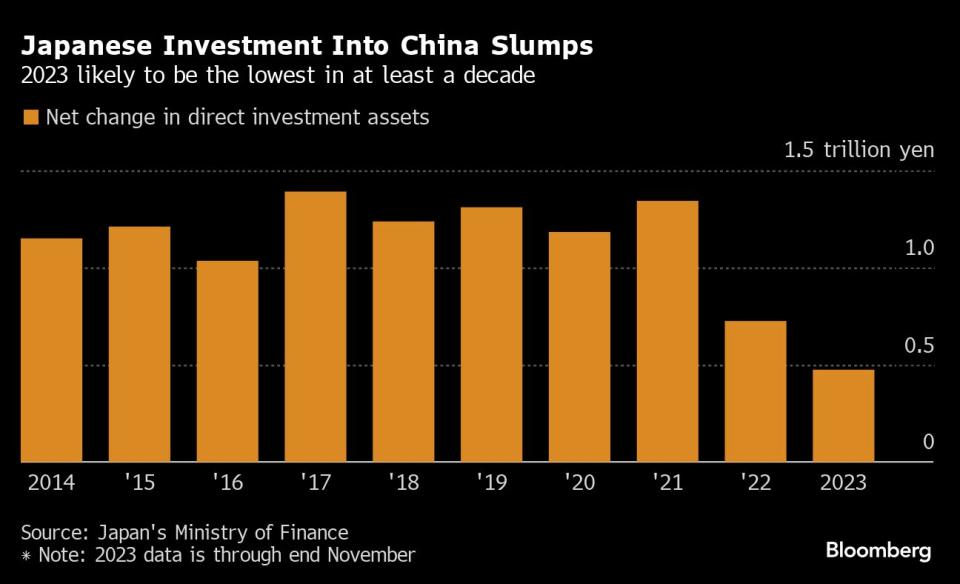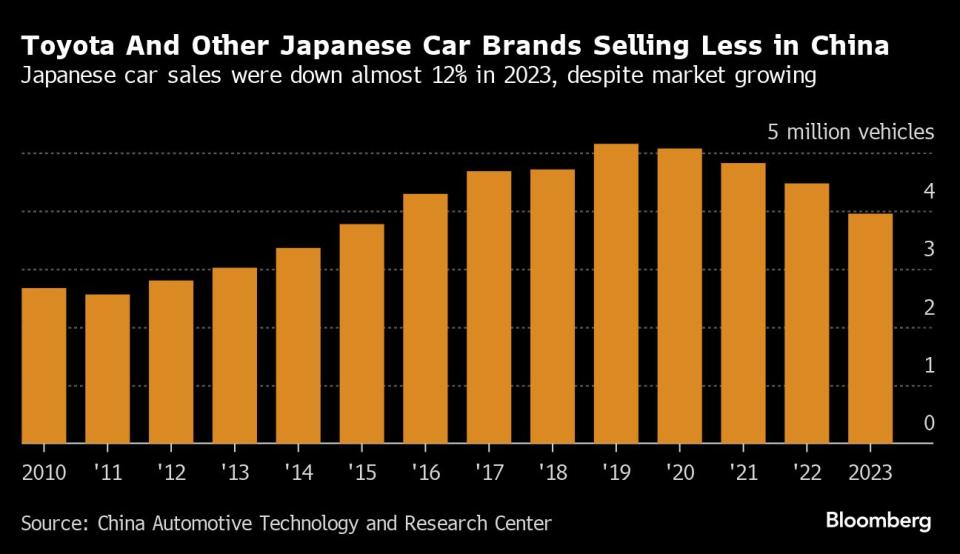Japan Executives Leave Beijing With Key Issues Unresolved
(Bloomberg) -- A high-powered delegation of Japanese executives is returning to Tokyo with little tangible to announce from their visit to Beijing except a promise from China’s leadership to improve the business environment.
Most Read from Bloomberg
Putin Sends US Signal on Ukraine Talks, Seeing War Advantage
One of World’s Richest Doctors Sees Fortune Surge to $12 Billion
JPMorgan Shuffles Top Managers as Jamie Dimon Prepares Successors
In a meeting Thursday in Beijing, the Japanese delegation asked Chinese Premier Li Qiang to waive a requirement that Japanese get visas to travel to China, according to officials from the Japan-China Economic Association, who briefed journalists after the discussion. Li said people-to people exchanges were important but called for reciprocity on visas, according to the readout.
Since China ended pandemic restrictions and reopened its border, Tokyo has pressed for a return to the visa-free travel that was available before Covid. A number of business groups have argued that this would make Japanese firms more likely to invest in China.
In the past year, China has allowed the citizens of at least 11 countries to enter without a visa — mostly via unilateral decisions that didn’t provide its citizens with the same right. Japan is requesting the same treatment, but Beijing has asked for visa-free entry for its own citizens as a condition of granting it to Japan, according to Japanese media outlets.
Li did pledge to improve the environment for foreign firms, the head of Japan’s biggest business lobby said after the sitdown, a sign of Beijing’s latest effort to lift the sentiment of overseas companies, which are increasingly unwilling to invest in China.
“It was a meaningful meeting,” Masakazu Tokura, chairman of the Japan business federation known as Keidanren, told reporters in Beijing immediately after the meeting. Li talked about the friendship between Japan and China and there was a real exchange of views, according to Tokura.
However, later in the day, another member of the Japanese mission was less bullish.
“Most of the issues were left to be solved later. It’s not like everything was going to be solved just by our visit,” said Kosei Shindo, the chairman of the association. “However, it was important that we could restart these meetings after they were halted by the pandemic and meet face-to-face,” he told journalists Thursday evening, adding that both sides seemed committed to solving issues.
Japanese businesses are some of the biggest foreign investors in China and it’s an important trade partner. However those ties look to be weakening, with exports to China falling last year and Japanese car sales dropping for a few years as the Chinese market rapidly moves to electric vehicles, causing Mitsubishi Motors Corp to announce last year that it would pull out.
In the roughly hourlong meeting with Li, the Japanese representatives raised a number of thorny issues, including concern about the safety of the nation’s citizens in China and bans on the import of seafood and other food products. In a separate meeting with the Minister of Commerce Wang Wentao, the delegation also raised areas of concern such as China’s anti-espionage law, difficulties on bidding for government contracts and the rules on cross-border data transfers, according to a briefing for journalists by representatives of the Japanese association.
Later in the day, the Chinese Ministry of Foreign Affairs rejected concerns about the anti-espionage law, with spokesman Wang Wenbin saying “as long as companies are operating in accordance with the law, they should be worry free.” China will continue to open up to foreign businesses and “we hope Japan will provide a nondiscriminatory business environment for Chinese companies,” Wang said.
Separately on Thursday, the Chinese Ministry of Defense criticized Japan’s defense policy, including its cooperation with Australia, South Korea and the US.
“In recent years, Japan has made moves that violate its own pacifist constitution and its exclusively defense-oriented policy,” Chinese Defense Ministry spokesman Wu Qian said at a regular briefing in Beijing. “It has vigorously developed offensive weapons, made and spread false narratives and provocative remarks and built up small group alliances under the pretext of the alleged ‘China threat.’ China is totally opposed to these acts.”
--With assistance from Colum Murphy, Allen Wan and Brian Fowler.
(Updates with details on economic relations in ninth paragraph.)
Most Read from Bloomberg Businessweek
How a Lucky Break Fueled Eli Lilly’s $600 Billion Weight-Loss Empire
How the West’s Favorite Autocrat Engineered Africa’s Most Dramatic Turnaround
AI Needs So Much Power That Old Coal Plants Are Sticking Around
Goldman, Lazard Look to Ex-Spies to Gain an Edge in Volatile World
©2024 Bloomberg L.P.






